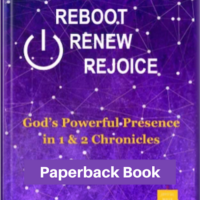2 Chronicles 1-5 • Celebrating God’s Presence with Us

AI was not used to generate this post.
Do you like celebrations? For what reasons do you celebrate? Have you ever celebrated the presence of God in your life? In the last post, we looked at how trustworthy people put God first in their hearts and in their ambitions. This is post #5 in the Chronicles blog series. In this article, we will look at why we should celebrate God’s presence with us and how to do that. Solomon is our example.
Key Takeaways
- Celebrating God’s presence brings joy, as seen in Solomon’s dedication of the temple.
- God tested Solomon’s heart, revealing his sincerity and desire for wisdom before blessing him.
- Solomon’s temple construction took seven years, showcasing God’s glory and purpose.
- Access to God was once limited but has been made available to all believers through Jesus Christ’s sacrifice.
- Today, God’s presence dwells within believers, empowering them to live in His glory constantly.
Listen to this post as a similar podcast from our Reboot Renew Rejoice Bible Study covering the books of 1 and 2 Chronicles in the Old Testament. (11 lessons)
In March 2001, two people began praying about planting a church in a large new development in North Texas. Soon, a dozen people joined them, then two dozen, and more. They met for about a year in a community center before the newly formed church was forced to find a place to meet outside of that development.
After moving to several different locations and even changing the church name, the Lord provided seventeen acres of land in a prominent location on a busy road in a nearby community. That small beginning has grown into a large church impacting its community in many positive ways. The people prayed. God responded and gave them the guidance and resources to build in His name. God did the same for Solomon and the people of Israel.
Building in His Name
As I started reading 2 Chronicles chapter 1, several things jumped out at me. In verse 3, all the national and tribal leaders assembled in front of the “Tent of Meeting” (also called the tabernacle) at Gibeon. This large tent and wooden pole assembly was more than 400 years old! Had any of the linen fabric panels been replaced? What about the poles with silver caps? Or had this magnificent portable “tent of meeting” withstood the elements of heat, cold, rain, and drought to still be standing 400 years after it was initially created? Perhaps the Levites in charge of keeping it up did a really good job. And it had been moved a bunch of times, too. Wow!
God tested Solomon
Solomon was crowned king at the tabernacle and sought the Lord’s guidance. We do not know what he asked. But God answered. That night God appeared to him and offered Solomon anything he wanted. I think this was a heart test. Do you remember David’s words to Solomon and the whole assembly before he died? He said that God would test the heart.
I know, my God, that you test the heart and are pleased with integrity. (1 Chronicles 29:17)
God was testing this 20-year-old man to see what was really in his heart. Was he a spoiled rich kid? Or was he a sincere man who would follow the example of his father David?
Considering God’s offer to him, Solomon answered God,
Give me wisdom and knowledge, that I may lead this people, for who is able to govern this great people of yours?” (2 Chronicles 1:10)
He recognized with those words who really was the King over Israel. God was!
I think Solomon’s response had been planted in his mind by his wise father David several years earlier. We covered that in the last article “Trustworthy People Put God First.”
Solomon passed the test
God was pleased with Solomon’s heart desire so God gave him what he asked.
God said to Solomon, “Since this is your heart’s desire and you have not asked for wealth, riches or honor, nor for the death of your enemies, and since you have not asked for a long life but for wisdom and knowledge to govern my people over whom I have made you king, therefore wisdom and knowledge will be given you. And I will also give you wealth, riches and honor, such as no king who was before you ever had and none after you will have.” (2 Chronicles 1:11-12).
Wisdom helped him to get ready for the next step—building the temple.
Ready, Set, Build!
The gifted general contractor
Solomon’s father David had provided the plans and provisions for building the temple. Solomon got started on the project. To oversee the actual building of the temple, God moved the king of Tyre to provide a general contractor named Huram-Abi. This is how Huram-Abi is described.
I am sending you Huram-Abi, a man of great skill, whose mother was from Dan and whose father was from Tyre. He is trained to work in gold and silver, bronze and iron, stone and wood, and with purple and blue and crimson yarn and fine linen. He is experienced in all kinds of engraving and can execute any design given to him. He will work with your craftsmen and with those of my Lord, David your father. (2 Chronicles 2:13-14)
God had gifted Huram-Abi with training, experience, and artistic skill. He knew how to do metalwork, weaving, embroidery, and engraving. He could do any design! What a resume! And he was able to work with others. That is equally important.
Our God is a creative God. To see how much our art matters to Him, read the blog, “Art Matters to God.”
Seven years of construction
The building of this spectacular structure took seven years. It must have been absolutely breath-taking when completed! I think about some of those old cathedrals in Europe still standing today that took over 100 years to build. They are quite beautiful. But God never took up residence in those buildings except through His people gathering for worship.
The privilege of the workmen
For the temple in Jerusalem, the craftsmen got to see the inside of the Most Holy Place while it was being built. They saw the place where God would take up residence with His people. They saw those fifteen-foot tall cherubim guarding the place for the “ark of the covenant” to rest. The craftsmen saw the cedar-lined walls adorned with gold and precious gems and the thick embroidered curtain hanging down. They got to see all the shiny objects and engravings in the Holy Place—the main hall of the temple. Once the temple was finished and God had taken residence in it, only the priests could go inside. But the craftsmen got to see it while it was being built! I love that!
Growing through the building
Solomon was a young man of around age twenty-two or twenty-three when he started the project. He would have been about thirty years old when it was finished. During those seven years, Solomon gained experience as a king and leader. During that time, he also had relative peace from other major challenges to Israel—especially attacks from enemies. Nothing distracted him from his building purpose. God did that for him. The future looked bright for Israel, didn’t it?
Sadly, we know the rest of the story. But at least for now, we can imagine the beauty of that temple and the joy it brought to the people whenever they were in the Lord’s presence there. I wish we had a 360˚ video tour of it. Don’t you?
Celebrating God’s Presence
When the building was complete, it was time to celebrate. But without God’s presence, it was just a beautiful building.
Moving the ark to the temple
Several months after the temple was completed, Solomon summoned all the leaders of Israel’s tribes to Jerusalem. When everyone arrived, the Levites took the ark out of the tent that housed it and brought it to the new temple. The priests then brought the ark to its place in the inner sanctuary of the temple, called the Most Holy Place. They put it beneath the wings of the cherubim that extended across the width of the ark and its carrying poles. Those priests were blessed to be able to see those huge cherubim and the ark resting beneath them.
Picture the scene: The priests withdrew from inside the temple. The altar was in front of the temple. On the east side of the altar, the Levite musicians dressed in fine linen stood and played their cymbals, harps, and lyres. Adding to the orchestra were 120 priests sounding trumpets. Then, joining them stood a Levite choir raising their voices in praise to the Lord and singing: “He is good; his love endures forever.”
God moves into the temple
The Bible tells us that at that time, the temple of the Lord was filled with the cloud of the glory of the Lord.
When Solomon finished praying, fire came down from heaven and consumed the burnt offering and the sacrifices, and the glory of the Lord filled the temple…When all the Israelites saw the fire coming down and the glory of the Lord above the temple, they knelt on the pavement with their faces to the ground, and worshiped and gave thanks to the Lord. (2 Chronicles 7:1-3)
The priests could not perform their service of offering incense and lighting the Menorah candelabra because of the cloud because the glory of the Lord filled the temple of God. That is called the Shekinah glory—the term shekinah from a Hebrew word meaning “settling” or “dwelling.” It was brilliant. Shiny. Very visible. Very memorable. God’s presence came to dwell in this earthly temple declaring it to be His own.
During the Exodus from Egypt, when the tabernacle was completed, something similar happened.
[God’s] cloud covered the tent of meeting, and the glory of the Lord filled the tabernacle. In all the travels of the Israelites, whenever the cloud lifted from above the tabernacle, they would set out; but if the cloud did not lift, they did not set out—until the day it lifted. So the cloud of the Lord was over the tabernacle by day, and fire was in the cloud by night, in the sight of all the Israelites during all their travels. (Exodus 40:34-38)
God inaugurated His tabernacle and His temple the same way—with the cloud of His glory.
Restricted access to God’s holiness
As magnificent as the temple was for Israel to see, only a few could enter it. Once the temple was finished and God had taken residence in it, only the High Priest could go into the Most Holy Place once a year. The priests could be inside the main hall of the temple (the Holy Place). If the doors were kept open during the day, people on the outside might get a peek inside, but they could not go inside. Yet, they knew that God was present with them.
The Power of God’s Presence with Us
Solomon’s temple stood for over 400 years. Then, a second temple was built. God took up residence in it as well. God promised this through the prophet Haggai,
I will shake all nations, and the desired of all nations will come, and I will fill this house with glory,’ says the Lord Almighty … ‘The glory of this present house will be greater than the glory of the former house,’ says the Lord Almighty. ‘And in this place I will grant peace,’ declares the Lord Almighty.” (Haggai 2:7, 9)
The glory of the second temple exceeded Solomon’s grand temple because God’s own Son, Jesus Christ, was present there 500 years later (Luke 2:22-35; John 12:23-32). But more than that, the restricted access to God was removed by Christ’s death and resurrection.
Restricted access to God removed
According to Hebrews 9:24, Jesus Christ entered heaven to represent us as our High Priest before God.
For Christ did not enter a man-made sanctuary that was only a copy of the true one; he entered heaven itself, now to appear for us in God’s presence. … Therefore, brothers, since we have confidence to enter the Most Holy Place by the blood of Jesus, by a new and living way opened for us through the curtain, that is, his body, and since we have a great priest over the house of God, let us draw near to God with a sincere heart in full assurance of faith, having our hearts sprinkled to cleanse us from a guilty conscience and having our bodies washed with pure water. (Hebrews 9:24; 10:19-22)
Now, every believer can enter the presence of God at any time with confidence (Hebrews). What a gift!
But even more than that, we have the power of our God’s presence with us 24/7.
God’s continual presence with us
After Jesus’ resurrection, God sent the Holy Spirit to inaugurate His new temple—those who put their faith in His son.
When the day of Pentecost came, they were all together in one place. Suddenly a sound like the blowing of a violent wind came from heaven and filled the whole house where they were sitting. They saw what seemed to be tongues of fire that separated and came to rest on each of them. All of them were filled with the Holy Spirit … While Peter was still speaking these words, the Holy Spirit came on all who heard the message. … The circumcised believers who had come with Peter were astonished that the gift of the Holy Spirit had been poured out even on the Gentiles. (Acts 2:1-4; 10:44-45)
The Holy Spirit comes to live inside of every believer. Because of that, we bear God’s glory today. That includes everyone from young to old, laborer to accountant, lower class to royalty, church staff and non-church staff. We all have equal access to the power of God’s presence by our faith in Jesus Christ.
Often, I wish I could have been there on the day of Pentecost when the Spirit was given. God inaugurated His new temple (individual believers) with a visible fire just like He did for the tabernacle and the temple. Though I do not see the flames of fire on the heads of new believers now, I certainly see the presence of God in them (including myself) when I see changed lives—men and women who are “on fire” for Jesus.
Living in the Presence of God
Today, we do not need to go to a temple building or pray in a certain direction toward a temple building to see God or to experience His presence. He is inside each of us. I am in His presence all the time because I am His temple. Whenever I am with my Christian sisters and brothers, I am in the presence of God. So are you.
When you and I love God wholeheartedly, it shows in our lives. That gives us even more reasons to rejoice than Solomon and his contemporaries had! We will discover more about this in the next article.
Let Jesus satisfy your heart with the power of His presence. Then, live in that power!
Read all the articles in our 1 and 2 Chronicles series. The next post in this series is “Committing Yourself to God’s Presence.”
All of the above information is covered in the Reboot Renew Rejoice Bible Study of 1 and 2 Chronicles.
AI was not used to generate this post.


